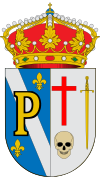Pastrana, Spain facts for kids
Quick facts for kids
Pastrana
|
|||
|---|---|---|---|

Panorama of Pastrana
|
|||
|
|||
| Country | Spain | ||
| Autonomous community | Castilla–La Mancha | ||
| Province | Guadalajara | ||
| Area | |||
| • Land | 95.70 km2 (36.95 sq mi) | ||
| Elevation | 755 m (2,477 ft) | ||
| Population
(2018)
|
|||
| • Total | 873 | ||
| Time zone | UTC+1 (CET) | ||
| • Summer (DST) | UTC+2 (CEST) | ||
| Website | Official website of Pastrana: http://www.pastrana.org (in Spanish) | ||
Pastrana is a small town in Spain. It is located in the province of Guadalajara. This province is part of the Castilla–La Mancha region. As of 2022, about 850 people live there. The town covers an area of about 95.70 square kilometers.
Contents
Where is Pastrana?
Pastrana is in a natural area called Alcarria. This region is known for its beautiful landscapes. The town is built where two small streams meet. These streams are close to the Arlés River. The Arlés River is a small branch of the larger Tagus River.
Pastrana's History
Pastrana has a long and interesting history. It grew from a small settlement into an important town.
Early Beginnings of Pastrana
We do not know much about Pastrana from very old records. It is believed that the town was started by the Order of Calatrava. This was a group of knights who ruled the Alcarria region. They had a strong castle in a place called Zorita. This was in the late 1100s.
In 1369, Pastrana was given a special privilege. It became a "township," which meant it could make its own rules. This made it independent from Zorita. As Zorita became less important, Pastrana grew. It became a busy market town in the 1400s. People would come from all around to buy and sell goods.
A Center for New Ideas
In the early 1500s, Pastrana was a place where new religious ideas were popular. These ideas were part of a movement called the alumbrados.
The Moriscos and Silk
Later in the 1500s, many Moriscos came to Pastrana. Moriscos were Muslims who had converted to Christianity. They were forced to move from the Kingdom of Granada. This happened after a rebellion. Pastrana became a place with many Morisco people.
The Moriscos were very skilled. They helped the town's silk industry to grow and become very successful. They made beautiful silk fabrics.
Changes in the 1600s
In the early 1600s, the Moriscos were expelled from Spain. This meant they had to leave Pastrana. After they left, Portuguese people took their place in the local economy. This helped Pastrana avoid some of the economic problems that other parts of Spain faced at that time.
Later Years
In the 1700s and 1800s, Pastrana did not grow much. It became more rural, meaning it was more focused on farming. The town went through a quiet period.
See also
 In Spanish: Pastrana para niños
In Spanish: Pastrana para niños
 | Lonnie Johnson |
 | Granville Woods |
 | Lewis Howard Latimer |
 | James West |




